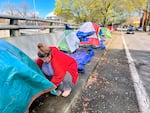
A young woman secures a tarp on her tent along SW 13th Avenue in Portland, April 4, 2022. Many campers stay in this area because of the close proximity Outside In where they are able to access support services.
Kristyna Wentz-Graff / OPB
Portland will begin enforcing its ban on homeless camping on public property on Nov. 13, according to Mayor Ted Wheeler.
“We committed to providing a two-week notice before beginning enforcement,” Wheeler said at a press conference Monday. “This is that two-week notice.”
The policy, approved by the Portland City Council in June, prohibits camping on all public property between 8 a.m. and 8 p.m. and introduces new restrictions to camping during other hours. Specifically, the policy bans camping overnight in city parks, along riverbanks, near busy streets, among other areas — and prohibits campers from building a fire, using a propane heater, erecting temporary structures, digging into the ground, and other actions at their rest site.
If someone violates this policy twice, they will be given a written warning from a Portland police officer. A third violation could leave them either with a fine of up to $100 or up to a month in jail.
The mayor said his office has spent the past three months educating homeless service providers and people who are currently homeless on the parameters of the new policy. That included creating a map that identifies all areas where people aren’t allowed to camp during the evening. Yet the city has no map detailing where people can legally camp overnight.
The policy is the result of recent case law and legislation. In 2018, a federal appeals court ruled that cities could not arrest people for sleeping on public property unless there were enough shelter beds available to accommodate that city’s homeless population. According to Multnomah County data, the county currently has 2,000 shelter beds open to the public, and around 90% of those are usually occupied. As of January, nearly 4,000 people were estimated to be sleeping unsheltered in the county on a given night.
Related: How homelessness in Oregon started, grew and became a statewide crisis
But Portland city attorneys believe a law passed by the Oregon Legislature in 2021 grants the city some wiggle room. House Bill 3115 gave cities the right to create “objectively reasonable” rules about when, where and how people can rest on public property. City attorneys believe the new policy meets that “objectively reasonable” requirement despite not having enough shelter beds available for the city’s homeless population.
Not all agree. In September, a group of Portlanders experiencing homelessness filed a class action lawsuit against the city, arguing that the ordinance was “impossible to understand or comply with,” largely because the city doesn’t identify where people are legally allowed to camp.
Wheeler said he has instructed Portland police to “selectively” enforce the policy until the city has enough shelter space available. Wheeler hopes to fill that shelter shortage with space at the city’s new large-scale outdoor shelters, called Temporary Alternative Shelter Sites. The city has only opened one of these shelter sites, which is made up of tiny sleeping pods, so far. According to Wheeler, the Southeast Portland site is currently sheltering about 180 people. The city announced plans last week to eventually open another large outdoor shelter in North Portland that could hold up to 200 people.
Wheeler said he’s told officers to focus their enforcement of the new ban on “areas that are the most problematic.”
Wheeler said the city’s Street Services Coordination Center — a department focused on homeless outreach — will be working with Portland police to prioritize getting people into shelter or connected with social services before turning to punitive measures.
Portland Police Chief Bob Day echoed the mayor Monday, adding that he expects the ban to be more complaint-driven than reactive. Day, who entered the chief’s office on October 11, said he hasn’t been updated yet on whether police officers have received the appropriate training to enforce this new policy.
